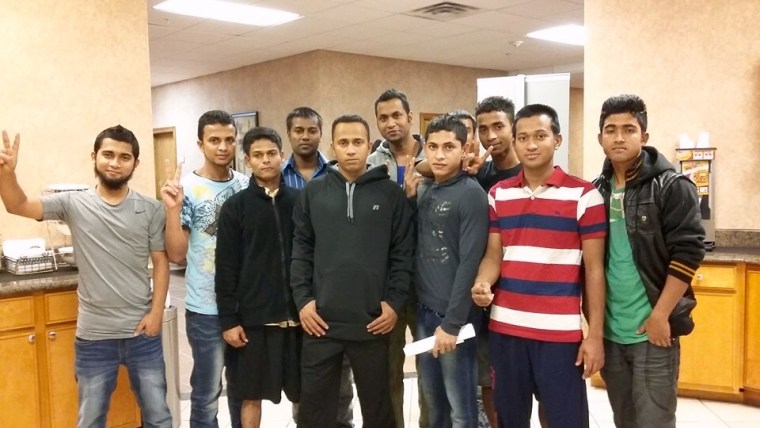Fifty-four South Asian detainees at the U.S. Immigration and Customs Enforcement (ICE) processing center in El Paso, Texas, held a week-long hunger strike to protest their detainment.
The majority of the detainees who held the strike, which began on Oct. 14 and ended Tuesday, are from Bangladesh, with a few from Afghanistan and Pakistan.
According to DRUM — South Asian Organizing Center, a South Asian immigrant rights organization in New York City working with the detainees, the 54 are seeking political asylum from their native countries. DRUM said that the detainees have passed "credible fear interviews," a measure immigration officials use when determining who is fleeing from danger, and were given parole notifications, but most have yet to be released from detention.
“Many of them felt their cases were unfairly handled in the court," Fahd Ahmed, DRUM's executive director, told NBC News. "Most of the strikers are from Bangladesh and they were granted parole and finding of credible fear. They were told to relocate to Bangladesh which is absurd given the current political climate.”
Ahmed alleged that ICE was deliberately holding onto the detainees’ paperwork. “It’s only when it got close to the 72-hour mark on the hunger strike on Friday afternoon, that [ICE] came with a stack of immigration papers and started handing them out,” he said.
Ahmed said many of the detainees’ appeals had passed the appropriate dates.
On Friday, 11 detainees--six of whom were part of the hunger strike--were released on the third day of the strike. In an interview with a local CBS affiliate in Texas, MD Nasir Uddin, a migrant from Bangladesh who was one of the detainees released, said that ICE failed to provide him with an interpreter or access to legal documents.
“We are seeking asylum, we are refugees. We are not criminals and they don't have any proof of criminals,” Uddin said.
DRUM reported that six of the detainees who were on strike are in critical medical condition due to dehydration. In an email to NBC News, ICE spokesperson Leticia Zamarippa confirmed that at least three detainees were given medical attention.
“Since Friday night, one of these detainees was taken to Del Sol Medical Center in El Paso for dehydration. He was treated and released from the hospital, and taken back to the EPC. On Saturday, two other detainees were taken to Sierra Medical Center in El Paso also for dehydration, and both were also treated and returned to the EPC,” Zamarippa said.
ICE also issued a statement in response to the strike and the protests, saying, “ICE takes very seriously the health, safety, and welfare of those in our care and we continue to monitor the situation. ICE’s El Paso Processing Center is staffed with medical and mental health care providers who monitor, diagnose and treat residents at the facility. ICE also uses outside, private medical/mental health care service providers as needed. Individuals have access to meals served three times daily at the cafeteria, snacks provided by the facility, or food purchased from the EPC commissary.”
But according to DRUM, many of the detainees reported harsh treatment from the guards and inadequate medical care, and said they were told by the staff to drink more water for every ailment.
DRUM also told NBC News that, on Friday night, almost a dozen officers marched into the area where the detainees were gathered and physically assaulted one of the lead co-organizers of the strike, Haji Khiay Mohamed Bilal.
“The guards took him away. No one knew where was he was two days and we found out later that he was in solitary confinement,” Ahmed said.
Bilal was released after calls from concerned community members into the facility and local ICE office, according to DRUM.
“We are seeking asylum, we are refugees. We are not criminals and they don't have any proof of criminals."
Ahmed said that ICE used intimidation tactics, and added that the Consul General Md. Shamsul Alam Chowdhry of the Consulate General of Bangladesh’s office in New York City visited the facility in El Paso on Tuesday to coax the detainees to end the strike.
“Consular Chowdhry was in the detention center after 10 hours and is intimidating strikers to eat or he will get their documents from Bangladesh to expedite their deportation,” Ahmed said.
The detainees, with the exception of one person, called off the hunger strike Tuesday night. Ahmed said Haque made "vague promises" of releasing the remaining detainees who were on strike within coming weeks. At least 14 protesters at the LaSalle Detention Center in Louisiana are continuing their hunger strike, which began on Monday, in solidarity with the detainees at El Paso.
NBC News reached out to the Consulate General of Bangladesh's office on Tuesday, but received no response.
This isn’t the first incident of hunger strikes at El Paso. Last year, more than 40 Sikh detainees from India requesting political asylum organized a hunger strike to protest their detainment. The detainees eventually received political asylum.
